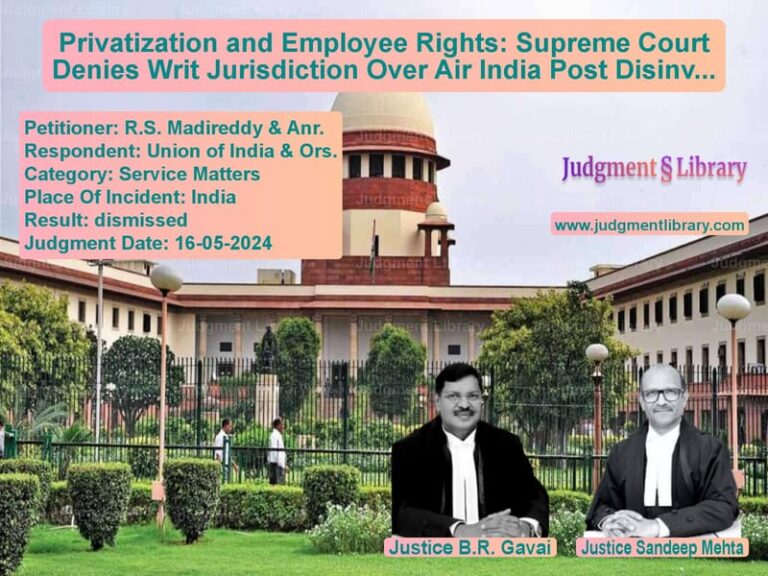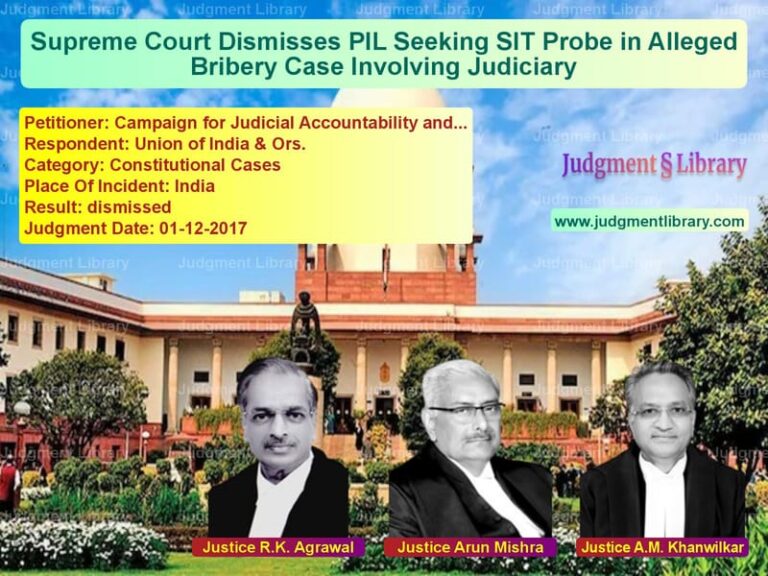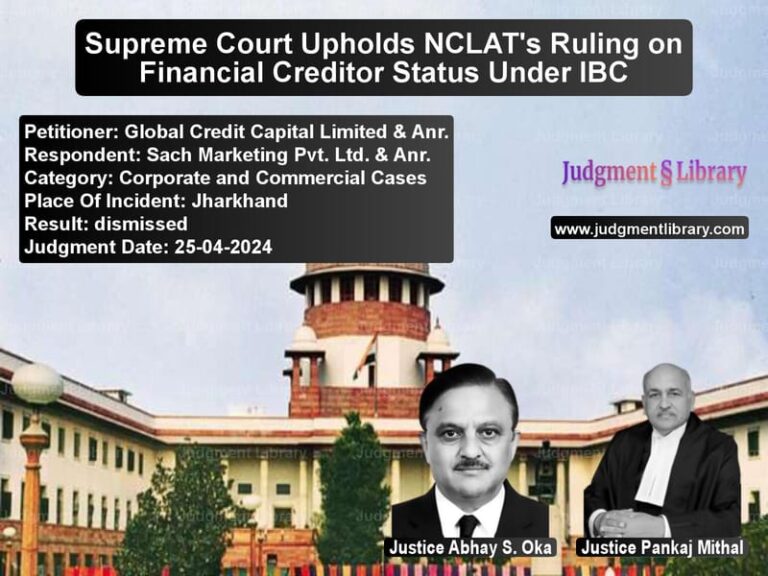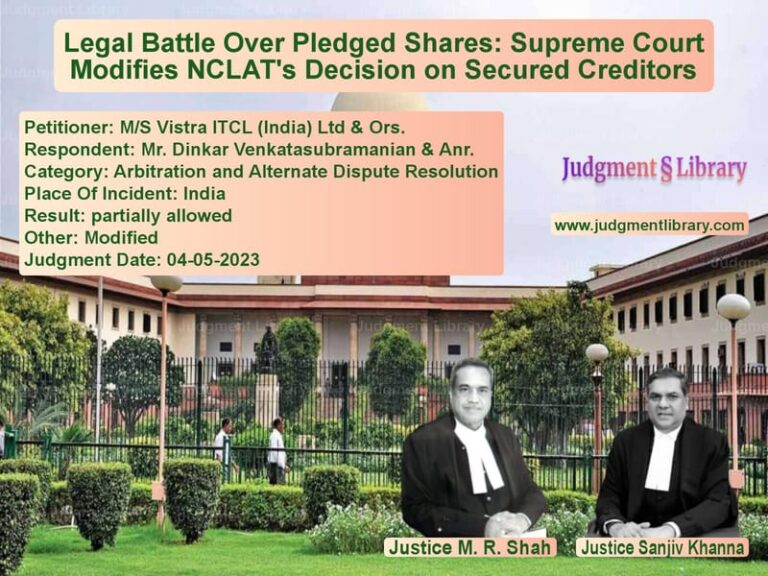Supreme Court Upholds Conviction in Tamil Nadu Gang Rape Case
The Supreme Court of India recently delivered a significant judgment in the case of Selvamani v. The State, upholding the conviction of the accused in a gang rape case. The ruling reaffirms the principle that the testimony of a rape survivor, if credible and corroborated by other evidence, is sufficient to secure a conviction. The case also highlights the detrimental impact of delayed cross-examinations on the trial process, often leading to witness tampering.
Background of the Case
The case originated in Tamil Nadu, where on January 27, 2006, a young woman working at Emerald Shoe Company, Vaniyampadi, was returning home from work when she was lured by her employer, Accused No. 1, under the pretense of discussing work-related matters. She was then taken to a secluded area near a railway bridge where she was confronted by four other men, including Selvamani (Accused No. 2). The victim was forcibly stripped, threatened with a knife, and gang-raped until the early hours of the morning.
After managing to escape, she informed her mother and aunt about the incident, and a First Information Report (FIR) was lodged the same day. The police investigation led to the arrest of the accused, and medical examinations corroborated the victim’s testimony. The trial commenced at the Additional District and Sessions Court, Thirupathur.
Trial Court Proceedings
The trial court framed charges under:
- Section 376(2)(g) IPC (gang rape)
- Section 506(1) IPC (criminal intimidation)
- Section 4 of the Tamil Nadu Prevention of Women Harassment Act
The prosecution presented 14 witnesses, including the victim (PW-1), her mother (PW-2), her aunt (PW-3), the investigating officer (PW-13), and the medical examiner (PW-8). The trial court found the accused guilty and sentenced each to:
- 10 years of rigorous imprisonment and a fine of Rs. 5,000 under Section 376(2)(g) IPC.
- 1 year of rigorous imprisonment and a fine of Rs. 1,000 under Section 506(1) IPC.
- 1 year of imprisonment under Section 4 of the Tamil Nadu Prevention of Women Harassment Act.
The sentences were to run concurrently, and the period already undergone was to be set off. Accused No. 5 had passed away during the trial, leading to the abatement of proceedings against him.
Appeal Before the High Court
The convicted individuals, including Selvamani (Accused No. 2), filed appeals before the Madras High Court. They argued that:
- The victim’s testimony was unreliable.
- The medical report did not conclusively prove rape.
- There were contradictions in witness statements.
The High Court dismissed the appeals, holding that the victim’s testimony was corroborated by forensic and medical evidence and that minor contradictions were not sufficient to overturn the conviction.
Appeal Before the Supreme Court
Selvamani (Accused No. 2) approached the Supreme Court, represented by Advocate Rahul Shyam Bhandari, who contended:
- The victim and her family had retracted parts of their statements during cross-examination.
- The medical report did not strongly support the allegations.
- The delay in cross-examination led to inconsistencies in witness testimonies.
The State of Tamil Nadu, represented by Senior Additional Advocate General V. Krishnamurthy, countered:
- The victim’s original statement was detailed and credible.
- Her testimony was corroborated by forensic and medical reports.
- The delay in cross-examination was exploited to influence witnesses.
Supreme Court’s Observations
The Supreme Court noted several key points:
- The victim’s testimony was consistent during examination-in-chief and her FIR was registered promptly.
- Her medical examination confirmed multiple injuries and signs of forced intercourse.
- The statements of her mother and aunt (PW-2 and PW-3) corroborated her claims.
- The retraction during cross-examination occurred three and a half months after examination-in-chief, raising suspicions of external influence.
Judicial Precedents Considered
The Court relied on past rulings, including:
- Khujji v. State of Madhya Pradesh (1991): A hostile witness’s testimony can still be considered if corroborated by other evidence.
- Vinod Kumar v. State of Punjab (2015): Delayed cross-examinations allow witness tampering, impacting trial fairness.
- C. Muniappan v. State of Tamil Nadu (2010): Minor contradictions do not invalidate a rape survivor’s testimony.
The Court emphasized that witness testimonies must be evaluated holistically and that cross-examination delays should not be used to discredit victims.
Final Judgment
The Supreme Court dismissed the appeal and upheld the convictions, stating:
- The trial court and High Court’s findings were based on a thorough evaluation of evidence.
- Cross-examination delays had been exploited to manipulate testimonies.
- The victim’s testimony remained credible despite the attempts to discredit her.
Conclusion
The Supreme Court’s ruling in Selvamani v. The State is a reaffirmation of the principle that a rape survivor’s testimony, if credible and corroborated, is sufficient for conviction. The judgment also underscores the need for timely cross-examinations to prevent witness manipulation. This case serves as a crucial precedent in protecting victims of sexual violence and ensuring that justice is not derailed due to procedural loopholes.
Petitioner Name: Selvamani.Respondent Name: The State Rep. by the Inspector of Police.Judgment By: Justice B.R. Gavai, Justice Sandeep Mehta.Place Of Incident: Vaniyampadi, Tamil Nadu.Judgment Date: 08-05-2024.
Don’t miss out on the full details! Download the complete judgment in PDF format below and gain valuable insights instantly!
Download Judgment: selvamani-vs-the-state-rep.-by-th-supreme-court-of-india-judgment-dated-08-05-2024.pdf
Directly Download Judgment: Directly download this Judgment
See all petitions in Rape Cases
See all petitions in Bail and Anticipatory Bail
See all petitions in Custodial Deaths and Police Misconduct
See all petitions in Attempt to Murder Cases
See all petitions in SC/ST Act Case
See all petitions in Judgment by B R Gavai
See all petitions in Judgment by Sandeep Mehta
See all petitions in dismissed
See all petitions in supreme court of India judgments May 2024
See all petitions in 2024 judgments
See all posts in Criminal Cases Category
See all allowed petitions in Criminal Cases Category
See all Dismissed petitions in Criminal Cases Category
See all partially allowed petitions in Criminal Cases Category







